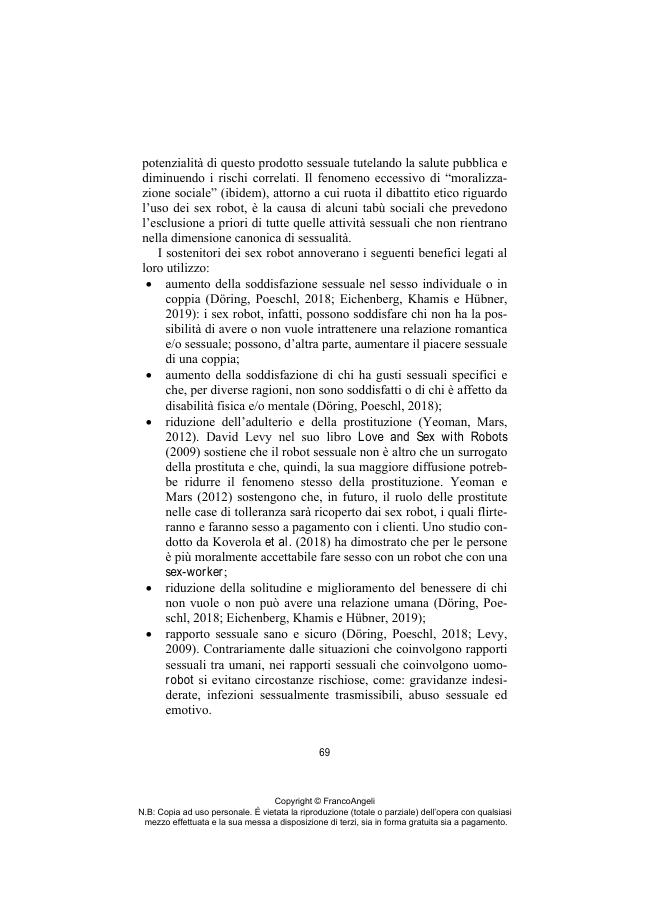Sex robot : "bene" di consumo o "beneficio" terapeutico?
63-75 p.
La società odierna, caratterizzata dall'incessante progresso tecnologico, pone i professionisti della salute e l'intera comunità di fronte ad interrogativi etici riguar-do l'interazione uomo-robot e l'uso dei sex robot in ambito terapeutico. La comparsa dei sex robot ha diviso la comunità scientifica, e non, in due orientamenti: il primo, che adotta un approccio promozionale, mira a sostenere i benefici dei sex robot quali prodotti sessuali in grado di migliorare la qualità della vita e il trattamento di disturbi sessuali e, il secondo, al contrario, che adotta un approccio preventivo, condanna e lamenta i rischi del loro uso.
Secondo Doring e Poeschl (2018), l'avanzamento tecnologico di prodotti sessuali fornisce opportunità per la creazione di progetti di promozione della salute e, pertanto, sarebbe necessario un approccio integrato ed uno sforzo congiunto da parte di psicologi, neuro-scienziati, ingegneri ed altri esperti in materia di salute sessuale, nel perfezionare robot che abbiano un'influenza positiva sulla salute sessuale pubblica. Obiettivo del presente lavoro è quello di mettere in luce la relazione tra tecnologia e sessualità, evidenziando i rischi e i benefici derivanti dall'utilizzo dei sex robot e sottolineando le attitudini dei professionisti della salute nei confronti dell'uso dei sex robot in ambito terapeutico. [Testo dell'editore].
In a society dominated by technological progress, sexuality, as a need of the human being, requires particular attention and to deserve a careful look is precisely the interaction between sexuality and robotics. The latter, was born as a field of research and interdisciplinary practice which, thanks to or because of its developments on human-machine interactions, offers possibilities and raises questions in the field of sexual health. The triumph of sex dolls, as satisfactory tools for sexual purposes, has stimulated the reflection of numerous scientists to produce a sexual tool that came ever closer to the imaginary of the human being: the sex robot. The sex robot, in fact, recalls the characteristics of the human being in a more sophisticated way: it is able to entertain conversations, to experience emotions and has a pre-programmed personality. The sex robot even has the ability to simulate sexual movements and positions and to imitate an orgasm.
This sexual product, therefore, was developed specifically for sexual purposes. The "march" of sex robots in real life is becoming increasingly accentuated to the point that, according to some scientists, humans, in a few decades, will find themselves having more sexual relations with sex robots than with their fellow humans in the flesh. Faced with this unceasing technological evolution, the scientific community is questioning the relationship between sex robots and human beings, focusing on the ethical aspects related to the latter. It follows that the appearance of these sexual products in the cybernetic industry has divided the scientific community, and not, into two ethical orientations.
The first, considers sex robots to be potential, rather than deficient, tools for solving problems, such as pedophilia and prostitution; the second, on the other hand, considers the sex robots products capable of generating negatively significant social changes, such as an increase in deviant sexual behavior, the robotization of consent and the alienation of the human being. The position of those who consider sex robots as simple products for the exclusive use of a few people has also emerged in the scientific community. In addition, health professionals and the whole community are wondering about the use of sex robots in the therapeutic field. In fact, although the efficacy of other sexual products, such as sex toys, has been widely proven in the treatment of orgasm problems, on the effectiveness of sex robots as a therapeutic tool, however, there is little documentation.
The undoubted efficacy of sex robots in sexual therapy seems to have fueled a general skepticism by psychotherapists and physicians, who are relatively open to the use of sex robots in the treatment of sexual dysfunctions and whose attitudes are influenced by ethical considerations regarding their use. The skepticism towards these sexual products does not depend exclusively on a technophobic vision or on an excessive moralism but arises from the need to exploit the potential of this sexual product by protecting public health and reducing related risks. The ethical evaluation by physicians and psychotherapists depends on several factors, such as gender, age, reasons behind the use of these sexual products, past experiences and the different training of health professionals. In other words, female psychotherapists and physicians present more ethical concerns than their male colleagues.
Furthermore, younger therapists more easily accept the application of technology in the therapeutic field than their older colleagues. Sex robots, even, are rated negatively when used as a consumer product rather than as a therapeutic tool. The critical attitude of psychotherapists and doctors also depends on the negative association of sex robots with emotional dependence and pornography. Different sexual health professionals, namely psychotherapists and physicians, evaluate the use of sexual robots in clinical practice differently: the former, in fact, tend to be more critical than the latter. However, in clinical and therapeutic settings, the use of sex robots seems to increase in several fields of intervention, such as in the treatment of erectile dysfunction, premature ejaculation and anxiety related to the first sexual relationship or, even, with socially isolated people, sex offenders and, above all, with people suffering from dementia, autism and physical disability.
According to Döring and Poeschl (2018), the technological advancement of sexual products provides opportunities for the creation of health promotion projects and, therefore, the sex industry and engineers should jointly engage with other expert figures, such as health professionals, in perfecting robots that have a positive impact on people's sexual well-being. The aim of this work is to highlight the relationship between technology and sexuality, focusing attention on the risks and benefits deriving from the use of sex robots and emphasizing the attitudes of health professionals towards the use of sex robots in the therapeutic field. [Publisher's text].
Fa parte di
Rivista di sessuologia clinica : 1, 2020-
Articoli dello stesso fascicolo (disponibili singolarmente)
-
Informazioni
Codice DOI: 10.3280/RSC2020-001004
ISSN: 1972-5183
MATERIE
PAROLE CHIAVE
- Salute sessuale, sex robot, beneficio terapeutico, relazione, rischi, tecnologia
- Sexual health, sex robot, therapeutic benefit, relationship, risks, technology



